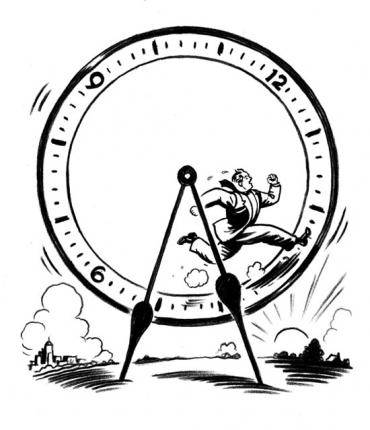Time out of Mind
A piece that appeared on the New York Time's OpEd page on March 7, 2008

IN 1784, Benjamin Franklin composed a satire, “Essay on Daylight Saving,” proposing a law that would oblige Parisians to get up an hour earlier in summer. By putting the daylight to better use, he reasoned, they’d save a good deal of money — 96 million livres tournois — that might otherwise go to buying candles. Now this switch to daylight saving time (which occurs early Sunday in the United States) is an annual ritual in Western countries.
Even more influential has been something else Franklin said about time in the same year: time is money. He meant this only as a gentle reminder not to “sit idle” for half the day. He might be dismayed if he could see how literally, and self-destructively, we take his metaphor today. Our society is obsessed as never before with making every single minute count. People even apply the language of banking: We speak of “having” and “saving” and “investing” and “wasting” it.
But the quest to spend time the way we do money is doomed to failure, because the time we experience bears little relation to time as read on a clock. The brain creates its own time, and it is this inner time, not clock time, that guides our actions. In the space of an hour, we can accomplish a great deal — or very little.
Inner time is linked to activity. When we do nothing, and nothing happens around us, we’re unable to track time. In 1962, Michel Siffre, a French geologist, confined himself in a dark cave and discovered that he lost his sense of time. Emerging after what he had calculated were 45 days, he was startled to find that a full 61 days had elapsed.
To measure time, the brain uses circuits that are designed to monitor physical movement. Neuroscientists have observed this phenomenon using computer-assisted functional magnetic resonance imaging tomography. When subjects are asked to indicate the time it takes to view a series of pictures, heightened activity is measured in the centers that control muscular movement, primarily the cerebellum, the basal ganglia and the supplementary motor area. That explains why inner time can run faster or slower depending upon how we move our bodies — as any Tai Chi master knows.
Time seems to expand when our senses are aroused. Peter Tse, a neuropsychologist at Dartmouth, demonstrated this in an experiment in which subjects were shown a sequence of flashing dots on a computer screen. The dots were timed to occur once a second, with five black dots in a row followed by one moving, colored one. Because the colored dot appeared so infrequently, it grabbed subjects’ attention and they perceived it as lasting twice as long as the others did.
Another ingenious bit of research, conducted in Germany, demonstrated that within a brief time frame the brain can shift events forward or backward. Subjects were asked to play a video game that involved steering airplanes, but the joystick was programmed to react only after a brief delay. After playing a while, the players stopped being aware of the time lag. But when the scientists eliminated the delay, the subjects suddenly felt as though they were staring into the future. It was as though the airplanes were moving on their own before the subjects had directed them to do so.
The brain’s inclination to distort time is one reason we so often feel we have too little of it. One in three Americans feels rushed all the time, according to one survey. Even the cleverest use of time-management techniques is powerless to augment the sum of minutes in our life (some 52 million, optimistically assuming a life expectancy of 100 years), so we squeeze as much as we can into each one.
Believing time is money to lose, we perceive our shortage of time as stressful. Thus, our fight-or-flight instinct is engaged, and the regions of the brain we use to calmly and sensibly plan our time get switched off. We become fidgety, erratic and rash.
Tasks take longer. We make mistakes — which take still more time to iron out. Who among us has not been locked out of an apartment or lost a wallet when in a great hurry? The perceived lack of time becomes real: We are not stressed because we have no time, but rather, we have no time because we are stressed.
Studies have shown the alarming extent of the problem: office workers are no longer able to stay focused on one specific task for more than about three minutes, which means a great loss of productivity. The misguided notion that time is money actually costs us money.
And it costs us time. People in industrial nations lose more years from disability and premature death due to stress-related illnesses like heart disease and depression than from other ailments. In scrambling to use time to the hilt, we wind up with less of it.
The remedy is to liberate ourselves from Franklin’s equation. Time is not money but “the element in which we exist,” as Joyce Carol Oates put it more than two decades ago (in a relatively leisurely era). “We are either borne along by it or drowned in it.”
Translation: Shelley Frisch
